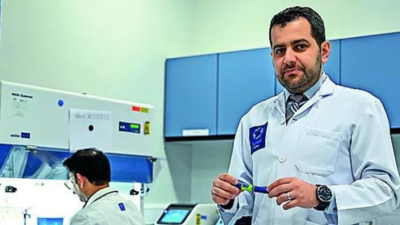ARTICLE AD BOX

TITUSVILLE (FLORIDA): Each astronaut aboard the Axiom- mission (Ax-4), including India's Group Captain Shubhanshu Shukla, is contributing to a first-of-its-kind medical study - an experiment called Suite Ride - that could redefine who gets to go to space. While TOI broke this story in March, more details have now emerged from an exclusive interview with Mohammad Fityan, Clinical Lead for the
Suite Ride experiment
and Chief Medical Officer at Burjeel Medical City.He said the crew is central to validating new technologies that could one day allow even
insulin-dependent diabetics
to safely fly. "At present, astronauts with diabetes-particularly those requiring insulin-are excluded from spaceflight. This study is laying the groundwork to change that," said Dr Fityan. The Suite Ride experiment, developed in collaboration between Burjeel Holdings and Axiom Space, is focused on monitoring how glucose behaves in microgravity and whether insulin remains stable during space missions. None of the four astronauts aboard Ax-4 has diabetes, but each has undergone pre-flight tests to establish individual glucose baselines on Earth.
"They act as healthy controls. This allows us to compare data from space against ground-based measures, which is crucial to validate the reliability of continuous glucose monitors (CGMs) in orbit," Dr Fityan said.At least one astronaut will wear a CGM (
continuous glucose monitoring
) device throughout the mission, with real-time metabolic data transmitted back to the research team. In addition, insulin pens-though not used by the crew-have been flown to test how the compound behaves when exposed to space conditions. Samples stored at ambient and refrigerated temperatures will be analysed after the flight to check for degradation."Microgravity gives us a chance to observe metabolic functions without the confounding factors of gravity, posture and muscle use," Dr Fityan said. This makes it easier to isolate how hormones and cells regulate glucose and could reveal early signs of insulin resistance that are harder to detect on Earth.The results, according to him, may eventually influence medical protocols for long-duration missions. "If this technology proves accurate and stable, the exclusion of insulin-treated diabetics could be reconsidered. This would be a step forward in making spaceflight more inclusive."Suite Ride also has terrestrial benefits. It could lead to smarter glucose monitoring tools and more effective insulin therapies for people on Earth-particularly those in remote or resource-limited settings. Technologies being tested include blood glucose monitors, i-STAT (blood analyser) devices, lancets, and remote data capture platforms.



.png)
.png)
.png)
















 3 hours ago
6
3 hours ago
6









 English (US) ·
English (US) ·